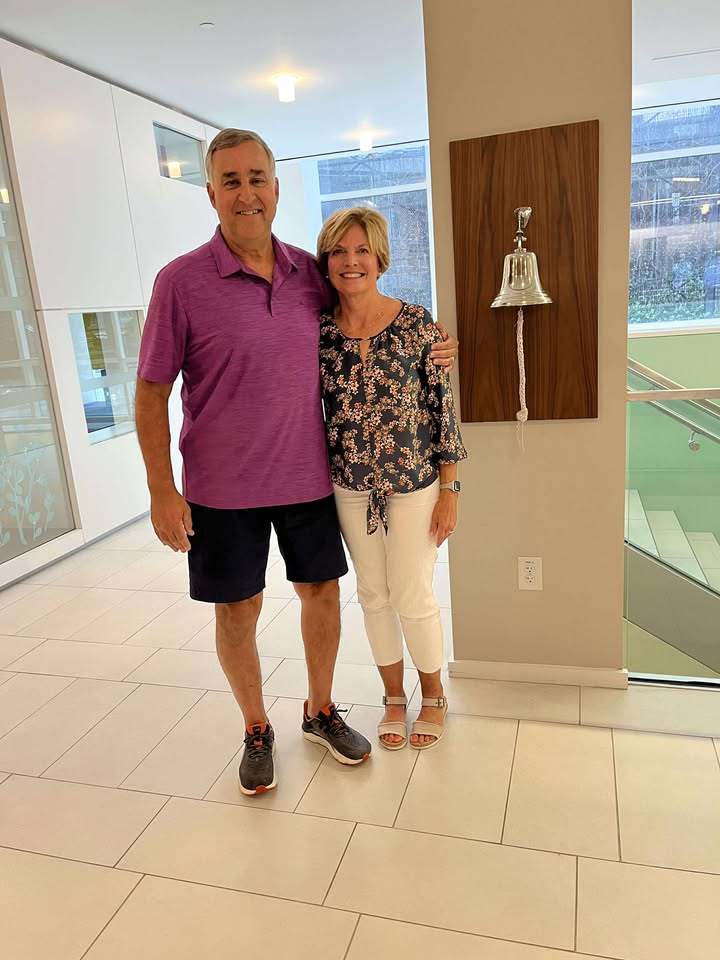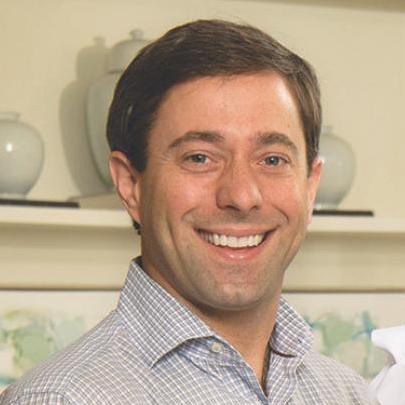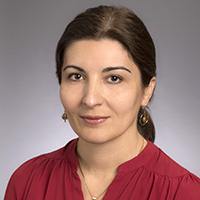As the only National Cancer Institute-Designated Comprehensive Cancer Center in Georgia, Winship is a leader in pediatric cancer treatments. Our staff conduct innovative research and clinical trials that transform how these cancers are identified, treated, and survived.
The subspecialized pediatric radiation oncologists at Emory Proton Therapy Center are international leaders in pediatric radiation oncology and proton therapy. We work with your child’s pediatric medical oncologist and pediatrician along with pediatric radiologists, pathologists, dieticians, social workers, child life specialists, physical therapists, and other specialists as needed. Your pediatric radiation oncologist will work closely with these and other specialists to customize your child’s pediatric cancer treatment plan, coordinate care, and reduce the stress and uncertainty related to your child’s diagnosis and treatment. We can also partner with a patient’s existing care team, whether they are across town or around the world.
Proton Therapy for Pediatric Tumors and Cancers
A childhood cancer diagnosis can be one of the biggest challenges your family will ever face. Our team is dedicated to helping you meet that challenge through supportive care using the most advanced treatments available. Pediatric Proton therapy may be a more precise radiation option for treatment of your child’s cancer to help protect the function of their growing organs and normal tissue, as well as reduce the risk of developing a future cancer. Our pediatric cancer specialists will work with you to develop a personalized pediatric cancer treatment plan that aims for fewer side effects and improved quality of life.
What We Treat
- Medulloblastoma
- Ependymoma
- Glioma
- Astrocytoma
- Oligodendroglioma
- Glioblastoma
- Atypical teratoid / rhabdoid tumor (ATRT)
- Choroid plexus carcinoma
- Optic nerve sheath tumor
- Optic nerve glioma
- Germ cell tumors
- Craniopharyngioma
- Hemangioblastoma
- Ganglioglioma
- Pineocytoma
- Neurocytoma
- Rhabdomyosarcoma
- Ewing’s sarcoma
- Osteosarcoma
- Other sarcomas
- Giant cell tumor
- Wilms tumor
- Lymphoma
- Neuroblastoma
- Retinoblastoma
- Re-irradiation
Children’s Healthcare of Atlanta and Emory Proton Therapy Center Streamline Access for Pediatric Cancer Patients
Proton Therapy Leads to Fewer Side Effects, Complications
Proton therapy is one of the most precise and advanced forms of radiation therapy available in the world today. In the hands of the expert cancer team at Emory Proton Therapy Center, this specialized pencil beam technology destroys cancer cells while minimizing damage to surrounding healthy tissues and organs. As a result, patients generally experience fewer short-term side effects and long-term complications than with traditional radiation therapy. This is especially important for children, whose bodies are still growing and developing.
At the Emory Proton Therapy Center, pediatric radiation oncologists work directly with pediatric medical oncologists, neuro-oncologists, surgeons and other specialists at the Aflac Cancer and Blood Disorders Center of Children’s Healthcare of Atlanta in a multi-disciplinary treatment approach. The Aflac Cancer and Blood Disorders Center is a national leader in pediatric cancer treatment and is consistently ranked among the top ten hospitals in the nation for pediatric cancer care by U.S. News & World Report. Together, we care for children and young adults with a wide range of cancer and blood disorders—from the most common to those rarely seen outside of the top centers. This clinical expertise, along with pediatric support services, makes the Emory Proton Therapy Center a top destination for the treatment of pediatric cancers.

Benefits of Proton Therapy
Children are particularly sensitive to the effects of radiation. By reducing or avoiding radiation to normal healthy organs and tissues, proton therapy may reduce the risk of problems in the growth, development, and function of your child. Reducing or avoiding radiation to normal tissues also reduces the risk of developing a future second tumor or cancer, which is most relevant in children and younger patients, especially those with a good prognosis and a long-life expectancy, and those children who may have genetic conditions putting them at higher risk for developing other cancers in the future.
Schedule a Consultation
What to Expect with Proton Therapy
The first step in your care is a consultation. During consultation, we review your child’s medical history, perform a physical exam, decide if any additional tests are needed, discuss all radiation options that may be appropriate for their care, make recommendations, and answer questions.
To plan their treatment, your child will undergo a “simulation” or planning session. During this visit our radiation therapists will help position them the way they will be treated each day. For children receiving radiation treatment to the brain or head and neck, a custom plastic mesh mask is made. This mask helps get them in the correct position for treatment and fits snugly to remind them to hold still during treatment. They can see and breathe through the mask. A CT scan will be done to create a picture of them in the treatment position to design their radiation plan. Some patients also undergo an MRI during this visit to help identify the target for treatment.
Sedation or anesthesia services are provided by specialized pediatric anesthesiologists for the youngest patients when necessary for simulation or treatment. Your care team will discuss with you whether sedation may be needed for your child. A child life specialist will provide developmentally appropriate education about what to expect and prepare them for any procedures and treatments. Our goal is to reduce stress for children and their families and create an optimal environment for healing.
It normally takes 10 days for the team to design the proton treatment plan and perform the quality assurance checks before treatment begins. Proton therapy is typically delivered once daily during weekdays, Monday through Friday. Most children receive treatment for four to six weeks of daily radiation. A few conditions can be treated in a shorter period of time. While some conditions are treated with radiation alone, proton therapy may be integrated with surgery, chemotherapy, immunotherapy, or other treatments as part of a comprehensive plan of care.
Like other types of radiation, proton therapy treatments are invisible and painless. Time in the treatment room for children can average 30 to 60 minutes each day, depending on the type of treatment or the need for sedation. At the end of each week of treatment, children select a toy from Pamela’s Proton Presents.
Children are seen by the radiation oncology physician team weekly during treatment to monitor progress, answer questions, address concerns, and manage any side effects from treatment. Your radiation oncologist will discuss a plan to assess response to treatment and for long-term follow-up after therapy.
Studies on Proton Therapy in Pediatric Cancer
Our team has identified these studies as examples of the clinical benefits of proton therapy in pediatric cancer.
Superior Intellectual Outcomes After Proton Radiotherapy Compared With Photon Radiotherapy for Pediatric Medulloblastoma
This retrospective study of 79 children evaluated the change in intellectual test scores over time after treatment for medulloblastoma with craniospinal radiation using protons versus x-rays. Adjusting for differences in patient populations, those treated with protons had superior long-term outcomes in global intelligence quotient (IQ), perceptual reasoning, and working memory compared to those treated with x-rays.
Endocrine Outcomes with Proton and Photon Radiotherapy for Standard Risk Medulloblastoma
This retrospective study of 77 children evaluated the effect of radiation on hormone production, comparing children treated with x-rays or protons. Children treated with proton therapy were less likely to develop low thyroid hormone, less likely to have low sex hormones (estrogen or testosterone), and were less likely to require any hormone replacement therapies. Preserving hormone function can have a significant effect on a child’s growth and development, and reduce the need for ongoing treatment to replace essential hormones. Children treated with proton therapy achieved a greater height than those treated with x-rays.
Clinical Outcomes Among Children With Standard-Risk Medulloblastoma Treated With Proton and Photon Radiation Therapy: A Comparison of Disease Control and Overall Survival
This retrospective study compared outcomes of children with medulloblastoma treated with craniospinal radiation at two different institutions with proton or x-ray therapy. The results showed that there was no difference in disease control or survival between the two types of radiation. This is important because the benefits of proton therapy in reducing or avoiding radiation to normal tissues did not reduce the effectiveness of the radiation treatment for the underlying cancer.
Pencil Beam Scanned Protons for the Treatment of Patients with Ewing Sarcoma
This retrospective study reported outcomes of 39 children or young adults treated with proton therapy for Ewing sarcoma. At 5 years after treatment, the likelihood of treated tumor control was 82%. Only two serious late toxicities were observed, and the likelihood of being free of serious toxicities from radiation at 5 years after treatment was 91%. The authors concluded that proton therapy for Ewing sarcoma was well tolerated with few serious late side effects.
Quality of Life Outcomes in Proton and Photon Treated Pediatric Brain Tumor Survivors
This retrospective study compared health-related quality of life outcomes in survivors of childhood brain tumors, comparing outcomes at two different institutions: one treated with protons, and one with x-rays. Children who had been treated with protons had improved health-related quality of life in physical and psychosocial areas compared to those treated with x-rays. Children who had been treated with proton therapy reported physical health similar to age-matched healthy children without brain tumors.
Patient Stories
“I’ve been through it, and I can’t say enough about the amazing care I received. The team who handled my treatments was absolutely wonderful, making a difficult time so much easier to navigate.”

My experience at Emory was incredible—it was as easy as drinking water! The therapy sessions only took about 5 to 10 minutes, and right after, I’d go for a 4-mile walk every single day. I had no side effects whatsoever—I can’t even tell that I had the treatment. Emory truly saved my life, and I couldn’t be more grateful.

Stephen, a 36-year old father from Columbus, Georgia, is one of the almost 2000 patients who have been treated at the Emory Proton Therapy Center since it opened in December 2018. He completed six weeks of proton therapy to treat a brain tumor.

“I went through 37 treatments for prostate cancer at the Emory Proton Center two years ago. The care I received from their team of professionals was amazing. I was willing to travel from South Carolina for treatment, and I’m so thankful I did. I started this fight in 2017 and today my PSA is still undetectable. Truly amazing folks.”

Proton therapy gave Zack his best shot at treating a spinal tumor that had come back. Zack was one of the first patients treated at the Emory Proton Therapy Center after it opened in 2018. The treatments, every weekday for six weeks, took less than one hour of his day and gave Zack the greatest odds of a long life with his wife and children.

Tony was diagnosed with prostate cancer in 2019 and sought care from experts at Emory Proton Therapy Center. He’s confident that the advanced radiation therapy gave him the best cancer treatment possible and says the comfort and care he got from Winship doctors and staff were unmatched. “There were many great solutions here in Atlanta, but the best to me was Emory Proton Therapy Center,” says Tony.


